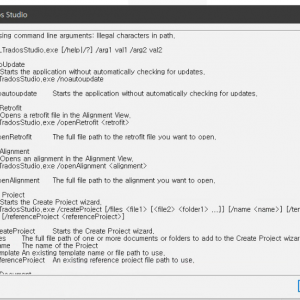“We know what we are, but know not what we may be.”
-William Shakespeare
Foreword
This lesson aims to show the big picture of what a translator’s career looks like for those of you trying to start a career in translation. This lesson consists of the following units:
- Characteristics of a translator’s career
- The translator’s aptitude and level of preparation
- The stages and settling time of a translator’s career
Characteristics of a Translator’s Career
Do you remember the Ant and the Grasshopper Story post that I wrote in my blog? I think that story sums up the various characteristics of a translator’s career nicely. Because most of the people around you have a life model similar to the ant, they might not be able to understand your dreams and plans of becoming a translator and might even ridicule or oppose it, asking if you can even make enough money to feed yourself doing that kind of work. Whether those people are doing that out of love and sincere worry for you or just simply out of ignorance or jealousy, you need to have the logic and knowledge to be able to reasonably refute them or at least the courage to ignore them in order to begin your career as a translator with dignity and confidence.
Of course, there are all kinds of different people who live their lives using the ant model; some who succeed and some who fail. The same is true with a translation career. There are also many different types of translators all working in different fields using different methods and strategies, so nobody can objectively argue whether the path of the ant or the path of the grasshopper is better. In the end, the question that you should ask yourself can be summarized as, “Is this the right path for me?”
For those of you who can confidently answer, “Yes!” I want to congratulate you on choosing the path of a translator and to say that you have chosen well.
This path will make possible a life that will make you happy and give you time for leisure, an income level significantly better than that of a regular office worker, the confidence that comes with being able to plan and create your own life, a life where you can take a vacation or a “mini retirement” whenever you want without permission from anyone, and a life where, should you wish to do so, you can live peacefully and inexpensively in the tranquil countryside or other scenic place.
I’ve dealt with the characteristics of the translator’s life in a fairly detailed way in my blog, so I won’t cover it again so extensively here. It can be summarized briefly as follows:
- A life without a commute to and from work
- A life without a boss
- A life with flexible work hours and methods
- A life without anybody that you must meet (face to face) for work
- A life without mandatory work-related (boring and useless) meetings
- A life where you can live anywhere you want
- Financial stability and employment stability
- A higher income than most salaried men/women
- The ability to plan your life so that every aspect of your life creates synergy for long-term development
- A happy life as a result
On the other hand, there are also factors like the following that you must overcome. Of course, they can all be overcome. However, it’s a good idea to know what they are from the start.
- Irregular income
- Irregular frequency of work
- It’s easy to live an isolated life
- You must do all kinds of things completely on your own
- There’s nobody who can give you advice during hard times
- Nobody can suggest a long-term strategy and vision for you
The Translator’s Aptitude and Level of Preparation
Judging from the fact that you’ve registered for my e-course, I can assume that you already have a strong motivation to pursue translation as well as a significant level of preparedness. I don’t think I have to explain anything too long-windedly to people like you, but I do want to address three things.
Aptitude is More Important Than Ability.
If you’re thinking about translation as a career and want to pursue the career for many decades instead of just as a temporary part-time job, aptitude is much more important than ability. Have you ever heard of the 10,000 hour rule? It’s a rule that dictates that doing something for approximately 10,000 hours will make you an expert in that field. (For those of you unfamiliar with the concept, I recommend looking it up on the Internet or reading the book “Outliers”.) If we look closely into the lives of the people we commonly know to be geniuses like Bill Gates, Mozart, the Beatles, etc., we can see that they’ve actually spent an enormous amount of time in their fields for an incredibly long period before they became familiar faces to the public.
But how on earth could they possibly spend the tremendous amount of time that is 10,000 hours continuously doing a certain kind of work? Simply put, it’s because they had an aptitude for it. It’s because, while they might not have been good at it, they enjoyed the work. Even someone like Picasso is said to have produced an immense number of pieces that we don’t even know about. And a significant number of those works are said to be of very poor quality. Gershwin is also said to have spent entire days composing. And a few of those countless pieces are made known to the public, so we call those people geniuses, but they’re actually just people who continuously do their work because they enjoy it.
I think the same is true for translators. I think delighting in seeing a delicate and nuanced thought expressed in a perfectly suited way with the appropriate words, and feeling irritated by seeing the opposite case indicates an aptitude for language. If you’ve started something that you enjoy, the rest is all just a matter of time. You just have to have patience and work at it continuously. Of course, this is still a business, so you must build a foundation by following the direction that I suggest here, listen to the strategies that I propose, and then put them into action. But even those things are nothing when compared to a translator’s own love of language and the kind of aptitude that makes one willing to work without pay simply because it’s so enjoyable. Compared to that, the rest is merely some advice.
Translation is a Knowledge Business
Translation is a great alternative for scientists or engineers, financial specialists, people who have retired as an expert of a special business domain, or people who wish to do other work because they’ve grown to dislike the people and practice of that special field. Though it’s hard to say that these people have a strong aptitude for language, they can still develop successful careers as translators. (Of course, the definition of success will vary depending on the person. And to add one thing, it’d be a good idea at this time to decide, even just temporarily, what success is to you and write it down in your notebook or post it up on your wall. If you don’t do this, you might devalue the things you’ve achieved and end up living in constant greed or discontent.)
For these kinds of people, I recommend you to mainly take on translation from your field of expertise instead of expanding into the general field. If you clearly state your experience and background on your profile, set a high price, and develop your translation career leveraging the personal connections you already have, I think your prospects are quite good. Then putting into practice the business strategies I recommend would be like the icing on the cake.
However, if you don’t already have a field of expertise that you’ve developed before starting translation, don’t worry. What’s more important than already having a field of expertise is constantly building up your knowledge. If you always take an interest in what’s happening in society and thoroughly read the news and magazines, and look up related articles instead of just searching the dictionary whenever something you don’t know comes up while translating, you will get to experience how much clearer the context will start to seem. Also watch a wider range of TV shows, movies, documentaries, etc. All those things will become the foundation to helping you produce better translation. A good translator is someone with a vast range of knowledge who never loses their curiosity and reads, listens, and discusses.
The Reward of a Translation Career Comes Slowly.
The reason I say this is because there are people who think of translation as a part-time job. Actually, there’s no harm in doing translation work for a little while to fill a space created in your work by some temporary matter. However, what I want to let you know is that the rewards are much greater if you make translation your career and do it long-term. There are a few reasons why that is.
- It takes quite a long time to build your reputation as a translator
- The more TM you accumulate by using CAT tools, the higher your rate of efficiency will become
- Familiarizing yourself with the translation business strategies also takes a considerable amount of time.
Because of the above reasons, you’ll go through difficulties that’ll feel like you’re “crashing head first” into something when you first start translation. This is true whether you consider translation a part-time job or a career. If you think of translation as a part-time job and only do it for a little while and then quit, that difficult process you go through at the beginning ends as just a difficult process, but if you approach translation as a career (and so invest in CAT tools, manage your time accordingly, and purposefully accumulate feedback), that difficult process becomes an investment for your future from which you can later reap the fruits of your labor. This is an important difference. If you don’t think of translation as just a part-time job to earn some petty cash but rather as a career to pursue for the rest of your life, you will be able to process your work with deep breaths and long-term insight. This will change how you spend your time and will also give you perspective regarding long-term investment.
The Stages and Settling Time of a Translator’s Career
Common Views on the Time It Takes to Settle
Anyone starting translation wonders how long it takes to settle into your career as a translator. In fact, it’s not just a mere curiosity, but also an urgent question related to one’s economic stability.
To summarize what the people who coach translators’ careers say, the general opinion seems to be that although it varies from person to person, it takes around three years if you work properly and diligently. I also largely agree with this figure of three years. Of course, this isn’t an exact number, and the number itself doesn’t really have significant meaning since everybody’s situation is different, as is the time and effort they invest. Still, it’s good to keep in mind that it takes quite a long time.
Settlement Stages
To say one “establishes a place” as a translator is actually a little ambiguous. There are lots of ambiguous expressions in the English language. To “establish one’s place” is also indeed an ambiguous expression. So, I’ll divide that into two stages.
Stage 1: The period of time from when you first start translation until you’re able to sustain your livelihood through translation alone without doing any other work.
The amount of money that one needs to earn to be able to sustain one’s livelihood through translation alone is different for everyone. The important thing here is the smaller that amount is, the shorter the amount of time it takes to pass through this first stage. That’s why I wrote quite extensively about frugality on my blog. On Corinne’s blog as well, she responds to a question about how to succeed as a freelance translator by unexpectedly talking about saving money. I think that was a very wise answer. The reason is that you must graduate from stage 1 in order to grow your translation business in stage 2. If it takes a long time to pass stage 1 because your basic cost of living is high, it’s obvious that growing your translation business will be difficult. That’s why thrift and saving is so important. In that sense, you are lucky if the entire burden of your living expenses is not on your shoulders. Those lucky people are able to easily graduate from stage 1 and move onto stage 2
Stage 2: The stage to develop and enjoy your translation business
It’s hard to say you’ve settled into your place as a translator just because you’ve completed the aforementioned stage 1. All you’ve done is earned enough to just cover your living expenses, and there’s a big possibility that, in doing so, you’ve had to accept projects you don’t like at rates you don’t like from clients you don’t like and are working under a lot of stress. In other words, you haven’t yet become a “happy translator”. That’s why those of you who have accomplished the requirements of stage 1 must move on to stage 2 to cultivate and develop your careers. You have to find a field to specialize your translation in as well as upgrade your clients (leaving the clients you don’t like for whatever reason and switching to better clients). You must increase your efficiency and even try looking for direct clients on your own. Stage 2 is developing your career through these kinds of tasks until you’re satisfied with it. While it’s possible to estimate where the end of stage 2 is, I wonder if stage 2 even has an end to it, because even after ten years, I’m still continuing on stage 2. (Of course, my stress has been reduced and I’m able to work more leisurely, and for that reason, you can say that I’ve already become a “happy translator”.) I also think about whether there’s another stage that follows stage 2. I think it’s better to see life not as a spurt toward a goal but rather as a leisurely walk that enjoys the process itself. So, if you have just entered into stage 2 after completing stage 1, I think it’s only wise to enjoy your work every day, revise and improve things here and there, evaluate your place and strategy monthly as well as plan out new strategies, and live your life grateful for all the things you’ve already accomplished rather than thinking about trying to “graduate” from stage 2. So, that’s why I don’t think there’s an end to stage 2.
Although the separation between stage 1 and stage 2 isn’t clearly defined, it seems that these two stages occur sequentially, so I think dividing the settlement process into two stages will help you have a more detailed picture of what that looks like.
The time it takes to complete stage 1
At the beginning stages of starting translation, you’ll think it’d be so nice just to be able to complete stage 1. Of course, the time it takes to get there will vary infinitely depending on your basic skill level and how much effort you invest after actually starting translation. But to risk a rough estimate based on my own experiences, I’d say it’d take around one and a half to two years. After about that much time had passed, I felt like I’d be able to live off of translation alone without any other source of income.
The time it takes to complete stage 2
Logically, you can move onto stage 2 right after graduating from stage 1. In other words, when you increase your income to the point where you can sustain yourself through translation alone, you must obviously start upgrading your translation business at that point. But perhaps some people will remain at that stage. Or maybe they’d continue to just take on more work (without any other adjustment). The reason someone might continue translation that way is because they don’t have a long-term strategy for their translation business. However, smart translators will move onto stage 2. Although there’s no end to stage 2, I’m guessing it’d take another year or year and a half to get to a state where you’re reasonably satisfied with your business.
So, adding these two stages together, I’d like to tell you that settling into your place as a translator will take around two to three and a half years.
This concludes lesson 1.






